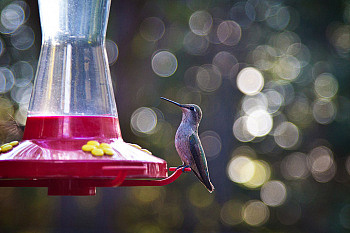 Songbirds come regularly to drink and bathe in a small birdbath just outside my window. The adults approach cautiously, flitting from branch to branch, looking around anxiously at each stop, lest the local hawk catch them unawares. Finally they land on the outermost edge, there to continue poised for flight even while drinking and bathing.
Songbirds come regularly to drink and bathe in a small birdbath just outside my window. The adults approach cautiously, flitting from branch to branch, looking around anxiously at each stop, lest the local hawk catch them unawares. Finally they land on the outermost edge, there to continue poised for flight even while drinking and bathing.
Into this ritually structured scene bursts a tiny, rumpled shape, a fledgling finch joyfully careening through the air, never a look to left or right, no reconnoitering stops along the way. Overflowing with enthusiasm and the joy of his aliveness, the little bird belly-flops into the middle of the birdbath, his beak turned up as if smiling, wings pounding the water, spray flying about, soaking his startled elders, who back away with an offended and disapproving hiss.
The fledgling brings to his life’s journey qualities of a true devotee—energy, enthusiasm, courage, a spirit of adventure, and the willingness to leap headlong into the challenges ahead—and with them the magnetism that attracts the self-protective reaction of formalized religion toward such irrepressible exuberance.
Namdev, the great devotee of the God Vishnu, goes on pilgrimage to Nagrath, there to worship God as Shiva at the time of Shivaratri, a popular Shiva festival. Filled with divine ardor, Namdev bows before the great temple doors, then enters the inner shrine where he touches the murti (statue that has been imbibed with the god’s spirit) of Shiva with the palms of his hands. “Knowing his love,” the story goes, “Shiva was much pleased in His mind.”
Returning to the open area outside the temple doors, Namdev, now in an ecstasy of devotion, begins a kirtan (chanting to music). People stream in from all directions. Caught up in Namdev’s joy, the assembled devotees are soon weeping with divine joy—their hair standing on end, all consciousness of body vanished, hearts awakened, souls yearning for God.
The local brahmins, proud official custodians of temple worship, have just completed their ritual bathing and rubbing of ashes on their bodies, all the traditional preparations for bathing the murti of Shiva in the temple’s inner shrine. Regarding themselves as the only ones with the right to perform worship in the temple, the brahmins are outraged to find their way into the temple blocked by a swirling crowd of devotees spontaneously dancing and singing to God.
Angrily the brahmins demand that Namdev and the bhaktas move their kirtan away from the temple, where their kirtan will no longer disturb the official worship of the brahmins.
Namdev humbly acquiesces, but inwardly despairs. “Lord,” he prays, “we are banned from standing before Your altar. How can we worship You when we cannot bow before the face of Your murti?” Even as Namdev’s prayer wafts upward, untold thousands of luminous banners shower down from the heavens, brilliantly lighting the kirtan with a divine effulgence. Fragrant flower petals float down in blessing on the upraised faces of the gathered bhaktas. Most wonderfully, the great temple itself rotates silently on its axis until the entryway—and inside, the murti of Shiva—are facing west, toward Namdev and the ecstatic devotees.
“Every gust of my prayer,” Master writes, “opens a new door in the vast temple of Thy presence.”
Our own Swamiji, forbidden the inner altar of his guru’s temple, cast out by religious officialdom, turned in desperate prayer to Master, seeking how he might serve, how he might worship now that the door to the only temple he knew was locked against him. Through faith, through the pure self-offering of perfect discipleship, through the falling fragrant petals of Master’s grace, the closing of that one door metamorphosed into the opening of spiritual temple doors everywhere: From the heavens descended a thousand banners of divine inspiration, manifesting as sacred writings and music, as spiritual communities and holy temples the world over, places of the heart where every sincere seeker is welcome, where each one can freely worship the Infinite Lord. “O Father,” our Master prays, “when I was blind I found not a door which led to Thee, but now that Thou hast opened my eyes I find doors everywhere.”
In divine friendship,
Prakash
